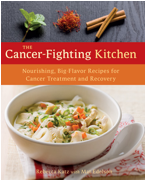Book Review: Cancer Fighting Kitchen
Author: Mat Edelson
Publisher: Celestial Arts, 2009, 232 pages
Information: $32.50 US
ISBN: 9781587613449
OncoLink Rating:
Rebecca Katz's second cook book for cancer survivors, The Caner Fighting Kitchen, is bright, beautiful and upbeat. On the whole, it provides good tips and unique recipes that may be helpful for some people as they or their loved ones are going through cancer treatment. However, because of the use of some hard to find ingredients and the complexity of many of the recipes, it may be of limited usefulness for many cancer patients. Rebecca Katz is certainly enthusiastic about food and nutrition and she highlights a number of exciting insights about healthy chemicals found in foods. She also champions the idea of mostly using organic ingredients and eliminating almost all meats and processed sugars, grains and flours. In theory, these practices may be beneficial, even though the current literature does not support the need to use organic ingredients or eliminate processed foods from the diet. In practice this kind of cooking is often difficult, time consuming, expensive and can place an added burden on a patient or caretaker during an already stressful time.
Some of the helpful features of this book are Ms. Katz's FASS system for tailoring dishes to an individual taste preferences and her culinary pharmacy section. Her FASS system, which stands for Fat, Acid, Salt and Sweet, helps tailor dishes to a person's up to the minute taste preferences and maybe helpful for those patients experiencing taste changes or lack of appetite. She generally recommends adding small amounts of well flavored ingredients to dishes to help spark interest in food. Her culinary pharmacy highlights recent research on fruits, vegetables, herbs and spices.
My main reservation about this book is the unsupported emphasis that the author places on using organic ingredients and unprocessed foods. While generally, eating more unprocessed foods is healthy, there are times during some treatments that this can be more of a problem for people. For instance, often after gastrointestinal surgery, eating higher fiber foods can cause discomfort, or may cause problems with healing. Likewise, there are reasons to eat organic foods, but no benefit during treatment has been documented. Trying to change shopping, cooking and eating habits during treatment can add stress to families during an already difficult time.
In the end, this book may offer useful ideas and insights to people with an established interest in whole foods cooking. However, if making the recipes or finding the ingredients is stressful, there are other cookbooks for cancer patients and many of them provide quick, easy to make recipes with ingredients you can find at a regular grocery store.

